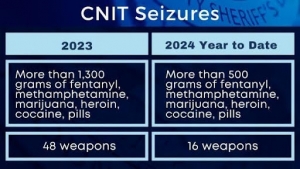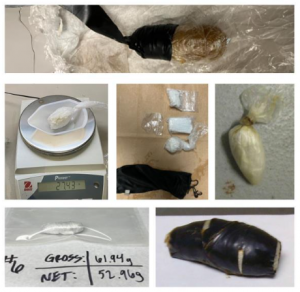 By Miriam Raftery
By Miriam RafteryJuly 13, 2024 (San Diego) – San Diego County Sheriff Kelly Martinez this week announced that random screenings for drugs and contraband will be implemented for all personnel assigned to county jails, as well as for contractors and others with business in county detention facilities, though not public visitation areas. Belongings will also be screened.
To protect security, the details, locations and frequency of screenings is not being disclosed, however a Sheriff’s K-9 dog trained to detect drugs will be present.
The action aims to further reduce San Diego’s high rate of in-custody deaths. In 2022, a state auditor report found that 185 people died in San Diego County jails from 2006 to 2020. Since then, Sheriff Kelly Martinez has rolled out many reforms which have reduced jail deaths, most of which occurred in people being held awaiting hearings. Her actions have reduced, but not eliminated jail deaths; six people have died in custody locally so far this year.

A Sheriff’s media release states, "Contraband and drugs entering our facilities pose a significant threat to incarcerated persons and our staff. We have a comprehensive security plan that includes interdiction, enforcement, education and harm reduction. Implementing these plans has taken incredible time and effort and continues to be a priority."
With more than 70 percent of arrestees entering jail facilities with some type of illicit substance in their system, it has been the top priority of the Sheriff to structure a more comprehensive intake and medical care screening process.
The Contraband and Narcotics Interdiction Team (CNIT) began as a pilot project in January 2023 at the San Diego Central Jail. The focus was on stopping drugs and other contraband during the booking process. CNIT has since expanded to two other booking facilities, Las Colinas Detention and Reentry Facility and Vista Detention Facility. CNIT works collaboratively with detention detectives and the mail processing center to find illicit substances.
 The success of CNIT has helped reduce overdose incidents in county jails by 27%. In most cases, CNIT turns over the contraband to the arresting agency for prosecution.
The success of CNIT has helped reduce overdose incidents in county jails by 27%. In most cases, CNIT turns over the contraband to the arresting agency for prosecution."Since the inception of the Sheriff's Contraband and Narcotics Interdiction Team in 2023, deputies have confiscated 1,045 grams of fentanyl from incarcerated persons entering our facilities," says Sheriff Martinez. "That can translate into saving the lives of 522,700 people, since just two milligrams of fentanyl can be lethal."
Since taking office in January 2023, Sheriff Martinez has made it her priority to improve San Diego County jails. Significant steps toward this goal include:
- Improving health and drug screening at intake
- Offering enhanced medical and mental health care services
- Providing wellness checks for the most vulnerable individuals
- Expansion of the Medication-Assisted Treatment (MAT) program
- Issuing body-worn cameras for deputies in the jails
- Expanded and direct access of naloxone to incarcerated persons
- Infrastructure plans are underway
 Sheriff Martinez explains: "As an organization, we focus our operational strategies on data and evidence-based solutions. Years of data and investigations told us our focus needed to be on the incarcerated population. We established systems that targeted those offenders. We have had enormous success with this approach. However, it is now time to add to those security measures with a contraband screening of all personnel, contractors, and professional visitors who enter our jails."
Sheriff Martinez explains: "As an organization, we focus our operational strategies on data and evidence-based solutions. Years of data and investigations told us our focus needed to be on the incarcerated population. We established systems that targeted those offenders. We have had enormous success with this approach. However, it is now time to add to those security measures with a contraband screening of all personnel, contractors, and professional visitors who enter our jails."Staff screenings and/or searches have been advocated for in recent years by community advocates, especially the Citizens' Law Enforcement Review Board, and the Sheriff has been working toward a system to implement that request, recognizing that more needs to be done to stop drugs and contraband from making it inside county jails.
"Thank you to the Citizens' Law Enforcement Review Board for their commitment in saving lives – we align with that goal and understand the vigilance needed to care for those in our custodial setting as well as staff and service providers," said Sheriff Martinez. "I appreciate the dedication and hard work of our employees who have been working overtime under often difficult conditions. They are the backbone of our operations, and their ingenuity has been at the forefront of solving these challenges."







Comments
Contraband searches
The employees' union objected to regular scans,
due to concerns over people being irradiated daily going through a scanner similar to those at airports. However inspections with drug-sniffing dogs make sense as would random body-scans.
Part of that is standard
I'm not certain, but I believe staff, inmates and visitors are already screened each and every time they enter the facilities. From Miriam's article it looks like this is only RANDOM screening for maintenance, employees, etc., and you're right, it probably should have already been in place.
No, staff members are not regularly screened, though inmates are
but I'm not sure about visitors.
Yes, these are only random screenings being implemented, no doubt due to the employees' concerns.Though I don't know why dog screenings couldn't be done all the time,other than perhaps cost or not having enough trained K-9s.